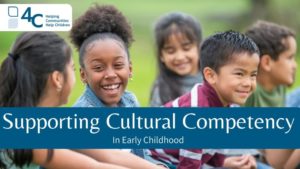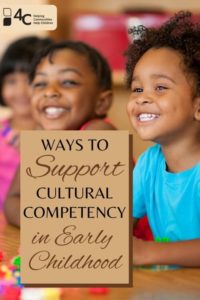
May 2022 – Published by 4-C
Cultural competency is an important component in early childhood development. It’s vital that children learn how to respect and accept those with different cultures and backgrounds. This helps prevent prejudice and discriminatory behavior both in the classroom and later in a child’s life. Through modeling cultural competency, educators and parents show children how to promote empathy, inclusion, and develop a healthy personal identity in our diverse world.
In childhood development, there are key stages that are vital in implementing these values that will stick with them throughout their life. According to the American Psychological Association, children as young as three are aware of differences such as gender, ethnicity, and disability and can begin to internalize biases reflected by their family, school, community, and in general.
Ways to build cultural competency at Home:
- Activities such as skin color match-ups with flesh-colored crayons
- Dolls and toys depicting children from different cultural backgrounds
- Pictures and books that celebrate cultural diversity
- Include your child(ren) in preparing and trying new foods
- Talk about different celebrations around the world
Cultural Competency in the Classroom:
- Represent first languages by ensuring written words and reading materials are available to every child
- Share songs from various cultural traditions, including those celebrated by the children in your care
- Traditions and celebrations can be a wonderful way for children to learn about diverse cultures
- Have photographs that responsibly reflect the diversity in your classroom
- Include books in your classroom library that highlight diverse characters
When discussing cultures different from yours, be mindful of how you frame these differences. Try to look beyond the stereotypes you may immediately think of and keep an open and curious mind. Understanding other cultures and becoming more culturally competent is a journey, so be kind to yourself and recognize you might make mistakes along the way. But with collaboration between educators and families, we can teach children cultural competence and acceptance to help shape a better future.
Resources:
- American Psychological Association: Children notice race several years before adults want to talk about it
- 4-C Pinterest Board: Supporting Bilingual Learners
- 4-C Pinterest Board: Diversity

